
Ducati Diavel Owners Manual: Charging the battery
Before charging the battery, it is recommended to remove it from the motorcycle.
 Important
Important
The battery is housed in the cowling, always contact a ducati dealer or an authorised service centre for its removal.
Remove the left cowling (1, fig. 137) Loosening: side screw (2, fig. 137) Retaining the electrical parts box; top screw (3, fig. 137) Retaining the electrical parts box; bottom screw (4, fig. 137) Retaining the central cowling;
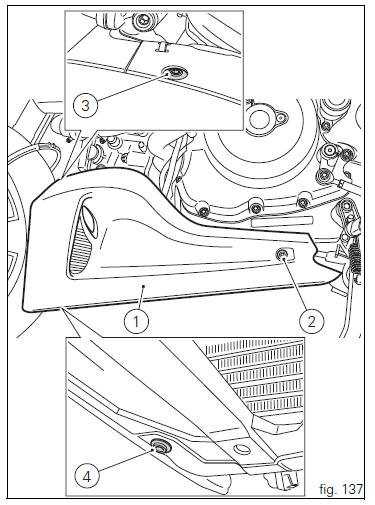
Screw (5, fig. 138) Retaining the central cowling to left cowling.
Unscrew the screws (6, fig. 139) And remove the battery mounting cover (7, fig. 139).
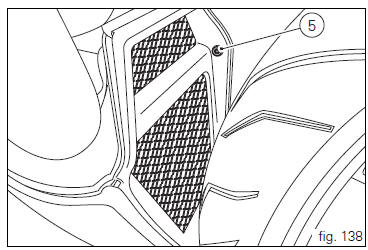
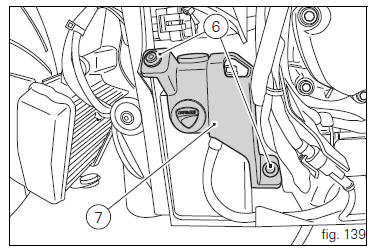
Slide out the battery (8, fig. 140) From its housing and, always starting from the negative terminal (-), loosen the screws (9, fig. 140).
Remove the positive cable (10, fig. 140), The abs positive cable (11, fig. 140) From the positive terminal and the negative cable (12, fig. 140) From the negative terminal.
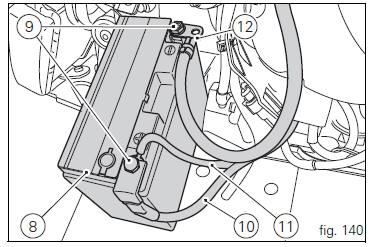
 Warning
Warning
The battery produces explosive gases: keep it away from heat sources and flames.
 Warning
Warning
Keep the battery out of the reach of children.
Charge the battery at 0.9 A for 5÷10 hours.
Charge the battery in a well-ventilated area.
Connect the battery charger leads to the battery terminals: red to the positive terminal (+), black to the negative terminal (-).
 Important
Important
Connect the battery to the charger before switching it on; failure to do so can result in sparking at the battery terminals, which could ignite the gases inside the cells.
Always connect the red positive terminal (+) first.
Lay down the abs positive cable (11, fig. 141), Onto positive cable (10, fig. 141) And start screw (9, fig. 141) In its thread on these cables.
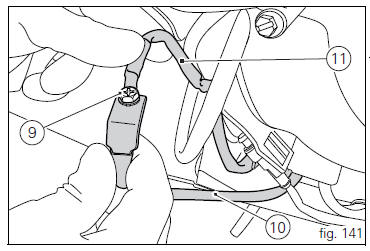
Connect the positive cable (10, fig. 142), Previously assembled to abs cable (11, fig. 142), To battery positive terminal, and negative cable (12, fig. 142) To battery negative terminal, by starting the other screw (9, fig. 142) In its thread.
Tighten the terminal clamp screws (9, fig. 142) To a torque of 5 nm ±10% and apply grease onto the battery terminals to prevent oxidation.
Reposition the battery (8, fig. 143) In the support, positioning the cables (10, fig. 143) And (11, fig. 143) As shown in fig.
143.
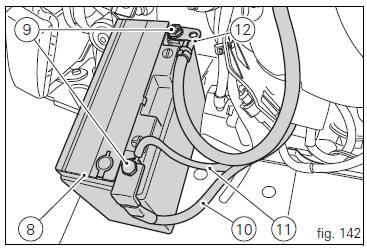
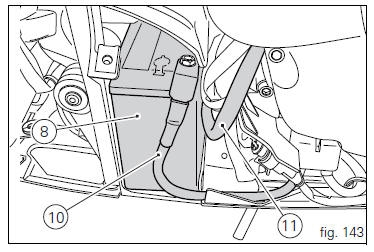
Refit battery mounting cover (7, fig. 144) And fasten tightening the screws (6, fig. 144) To a torque of 10 nm ±10%.
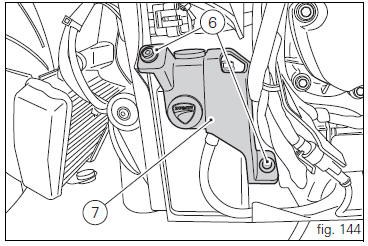
Refit the left cowling (1, fig. 145) As follows: start the side screw (2, fig. 145) Retaining the electrical parts box in its thread; start the top screw (3, fig. 145) Retaining the electrical parts box in its thread; start the bottom screw (4, fig. 145) Retaining the central cowling in its thread;
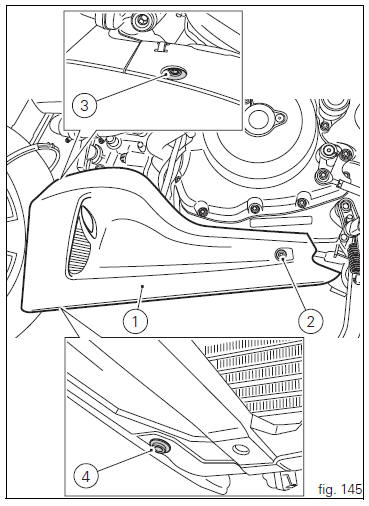
Start the screw (5, fig. 146) Retaining the central cowling to left cowling in its thread.
Tighten the screws (2, fig. 149), (3, Fig. 145), (4, Fig. 145) And (5, fig. 146) To a torque of 10 nm ±10%.
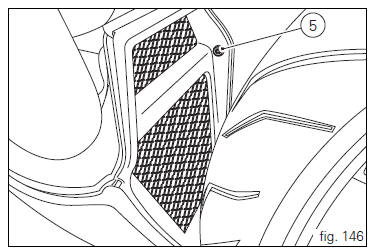
 Adjusting throttle control free play
Adjusting throttle control free play
The throttle twistgrip must have free play of 1.5×2.0 Mm in
all steering positions, measured on the outer edge of the
twistgrip. If necessary, adjust it using the adjusters (1 and 2,
fig. 135 ...
 Charging and maintenance of the battery during winter Storage
Charging and maintenance of the battery during winter Storage
Your motorcycle is equipped with a connector (1, fig. 147) To
which you can connect a special battery charger available
from our sales network.
...
Other materials:
Reassembly of the clutch-side crankcase cover
Fit the plug (14) and the gasket (13). Fit the plug (17) and the gasket (15).
If the bush has been replaced, fully seat the new bush (7) in the slot in the
cover using a suitable drift and a press.
If the sealing ring (8) needs to be renewed, fit the new seal into the crankcase
cover, po ...
Refitting the front sprocket
Grease the o-ring (16) and install it on the front sprocket spacer (15).
Fit the spacer, from the o-ring side, on the secondary shaft and drive it fully
home against the inner ring of the bearing.
Check that the splines of the gearbox secondary shaft and the sprocket are in
perfect condi ...
Rear brake
Rear speed sensor (abs)
Screw
Washer
Spring
Brake switch (rear)
Brake lever (rear)
Rear pump - control unit pipe
Sealing washer
Pin
Bush
O-ring
Screw
screw
Rear brake disc
Rear brake calliper
Rear brake master cylinder
Hose clip
Pushrod
Screw
Rubber pad
...